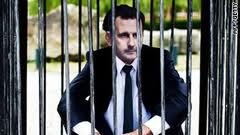 Syria’s National Council opposition group has unveiled a plan for a transitional period lasting up to 18 months if President Bashar al-Assad is toppled, but prominent Assad opponents said more unity was needed to bring his downfall.
Syria’s National Council opposition group has unveiled a plan for a transitional period lasting up to 18 months if President Bashar al-Assad is toppled, but prominent Assad opponents said more unity was needed to bring his downfall.
The 260-member council, which was formed in Istanbul in September as Assad intensified a military crackdown on street protests calling for his removal, announced its political program Sunday.
It said the council planned to lead an interim government with the help of the military to “guarantee the security of the country and its unity once the regime falls.”
Assad, battling eight months of protests against his rule, faces street demonstrations, increasing armed opposition, deepening international isolation and an economic crisis triggered by the unrest and aggravated by Western sanctions.
But despite reports of army conscript desertions, he has retained the loyalty of most military officers and government officials and says he will not bow to international pressure to stop a crackdown on foes he describes as “armed terrorists.”
The United Nations says 3,500 people have been killed in the crackdown. Authorities blame armed groups and say 1,100 police and soldiers have been killed.
Assad has promised a parliamentary election early next year, followed by a new constitution.
But the council said a transition to democracy after 41 years of Assad family rule “requires toppling the regime with all of its symbols,” followed by national reconciliation.
In a transition, the council said an interim government would organise an internationally supervised ballot within a year to elect a “founding assembly” that would draft a new constitution to be put to a referendum. A parliamentary election would be organised within six months.
The council would preserve the army, “which belongs to the people although it was violated by the repressive regime,” it said. The program did not mention the Syrian Free Army, a group of defectors which formed its own independent leadership council last week and has launched attacks on the military.
CRITICISM
The council got off to a rocky start amid criticism that it was dominated by Islamists and figures in exile with little connection to on-the-ground leaders of the uprising.
The release of its program came as prominent opposition figures – including some members of the council itself – said Assad’s opponents remained too fragmented to win the trust either of ordinary Syrians or world powers.
A statement by a group called the National Initiative to Unify the Syrian Opposition said there was yet no “opposition body that has the confidence of the Syrians and the international community to act as real transitional body that wins the recognition of the international community.”
One of the signatories, U.S.-based social science professor Amr al-Azm told Reuters: “The Council’s program has good points but the Council is acting like the a political party rather than a broad opposition movement.”
“The international community and the people on the ground in Syria are pressing for more opposition unity,” he said.
He said the Council needed to be expanded to give greater say to activists on the ground, to minorities such as Kurds, and to established opponents who resisted the rule of Assad’s father, Hafez al-Assad.
British Foreign Secretary William Hague was due to meet Syrian opposition representatives, including members of the National Council, in London Monday. So far, only post-Gaddafi Libya has officially recognized the council.
Reuters

Leave a Reply
You must be logged in to post a comment.